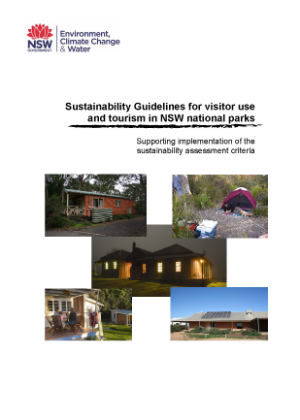The National Parks and Wildlife Act 1974 (NPW Act) permits accommodation in parks for some purposes.
Visitor accommodation can help increase visitation to parks, enhance visitor experiences of parks, and support the appropriate dispersal of visitation throughout the reserve system. It can take many forms including, but not limited to, camping facilities, historic or contemporary buildings, movable structures or caravans, and tourist parks.
Accommodation facilities will vary by location but must always meet high environmental standards and be appropriate to the natural and cultural setting. Information to ensure visitor accommodation is compatible with the protection of conservation values is available in the Sustainability Guidelines for visitor use and tourism in NSW national parks.
Policy
1-9. Options for visitor accommodation
- A variety of visitor accommodation should be provided across the park system to cater for a range of interests, comfort levels, disability, mobility and socio-economic considerations.
- Visitor accommodation (and ancillary facilities) must:
- be consistent with the relevant park plan of management or statement of management intent
- be consistent with park management policies
- ensure natural and cultural values are protected
- minimise environmental impacts at the site and in the surrounding area
- take measures to mitigate impacts on other park users
- be appropriately low-key and suitable for the location (see the Sustainability Guidelines for visitor use and tourism in NSW national parks)
- meet high sustainability standards (see the Sustainability Guidelines for visitor use and tourism in NSW national parks)
- create opportunities to enhance visitor understanding, enjoyment and appreciation of park values.
- The NSW National Parks and Wildlife Service (NPWS) aims to offer visitor accommodation experiences that enable visitors to enjoy and experience the natural and cultural values of parks.
- Visitor accommodation may be developed and managed either by NPWS or partner organisations, including commercial operators.
- Typical options for visitor accommodation include:
- built accommodation (new and adaptive reuse of existing buildings)
- semi-permanent accommodation (e.g. safari-style tents based on a hard frame or transportable 'pods')
- caravan and campervan style accommodation
- camping (including self-reliant camping and serviced camping options).
- New and innovative accommodation options may also be considered where these are consistent with the NPW Act, the relevant plan of management or statement of management intent, and this policy.
- Where a visitor precinct contains visitor accommodation, public access may need to be restricted to areas around that accommodation for the purposes of safety, security or operational requirements. For example, access to a fenced area around accommodation may be restricted to booked guests only while allowing other visitors to access the broader precinct.
- Proposals to build, own or operate visitor accommodation in parks will be considered on their merits, taking into account environmental considerations, and a business plan and commercial assessment. This will include, but not be limited to, impacts and restrictions on existing visitation, financial viability, financial return to government and benefits to the park and the community.
- Visitor accommodation may be occupied (as specified in the National Parks and Wildlife Regulation 2019) for a continuous period of no more than 21 days, unless otherwise specified in the relevant plan of management or as permitted under a lease or licence (where the limit may be for a continuous period of up to 3 months). The only exceptions to this restriction are either where:
- staff or caretakers must reside on-site for the management of the accommodation facility
- leased or licensed occupancies of caravans are inherited in newly created parks. The Holiday Parks (Long-Term Casual Occupation) Act 2002 sets out the maximum period of occupancy until the expiry of the existing interest.


